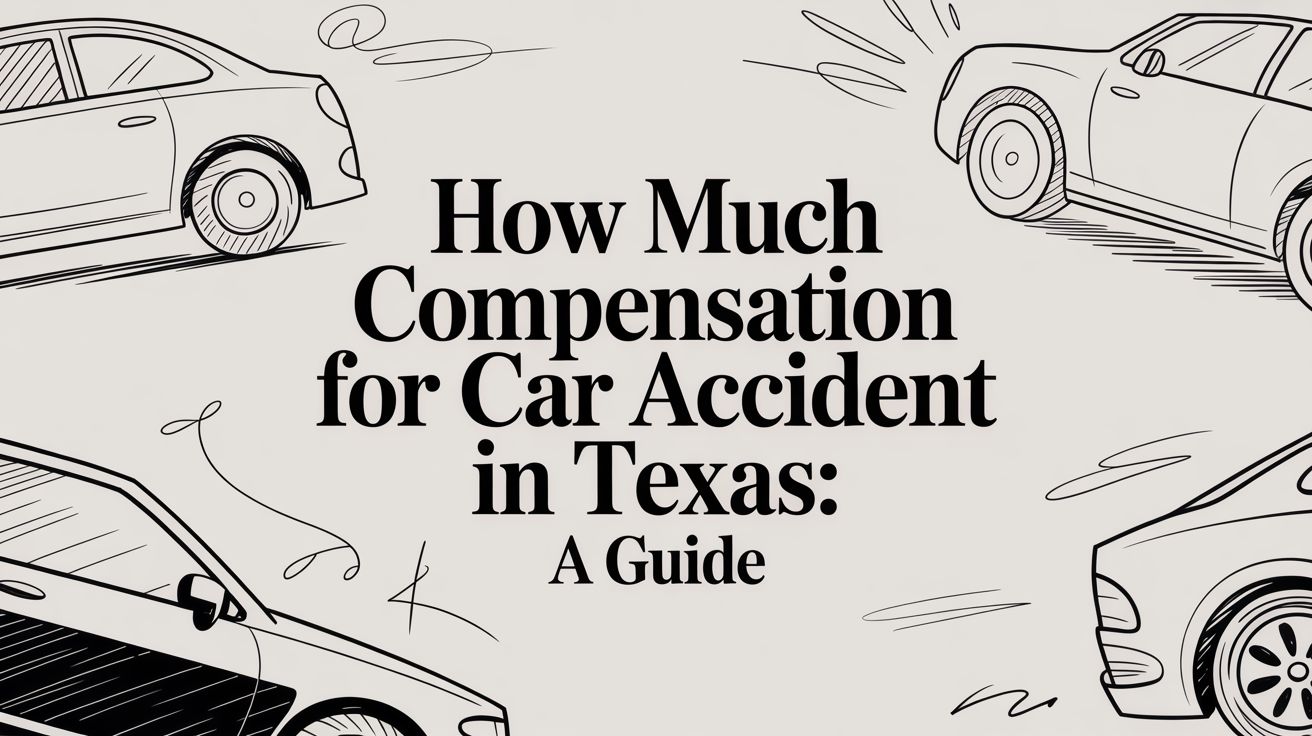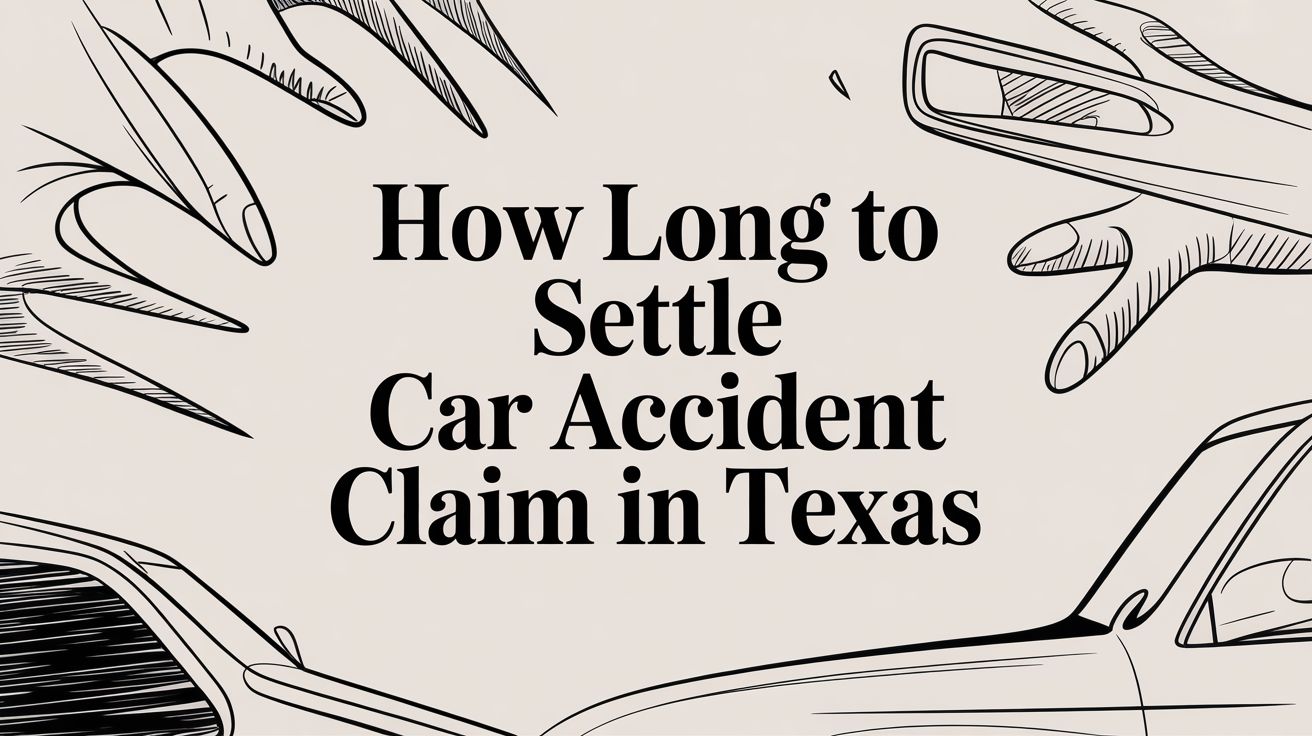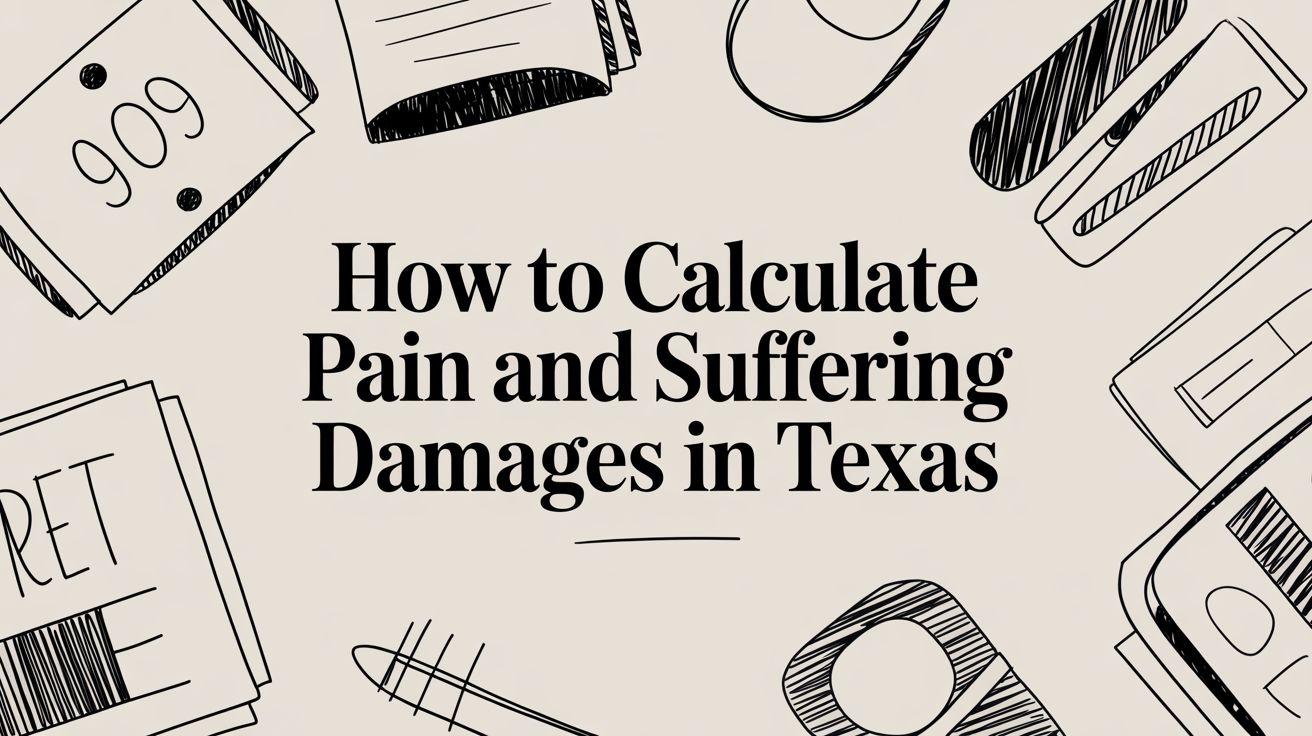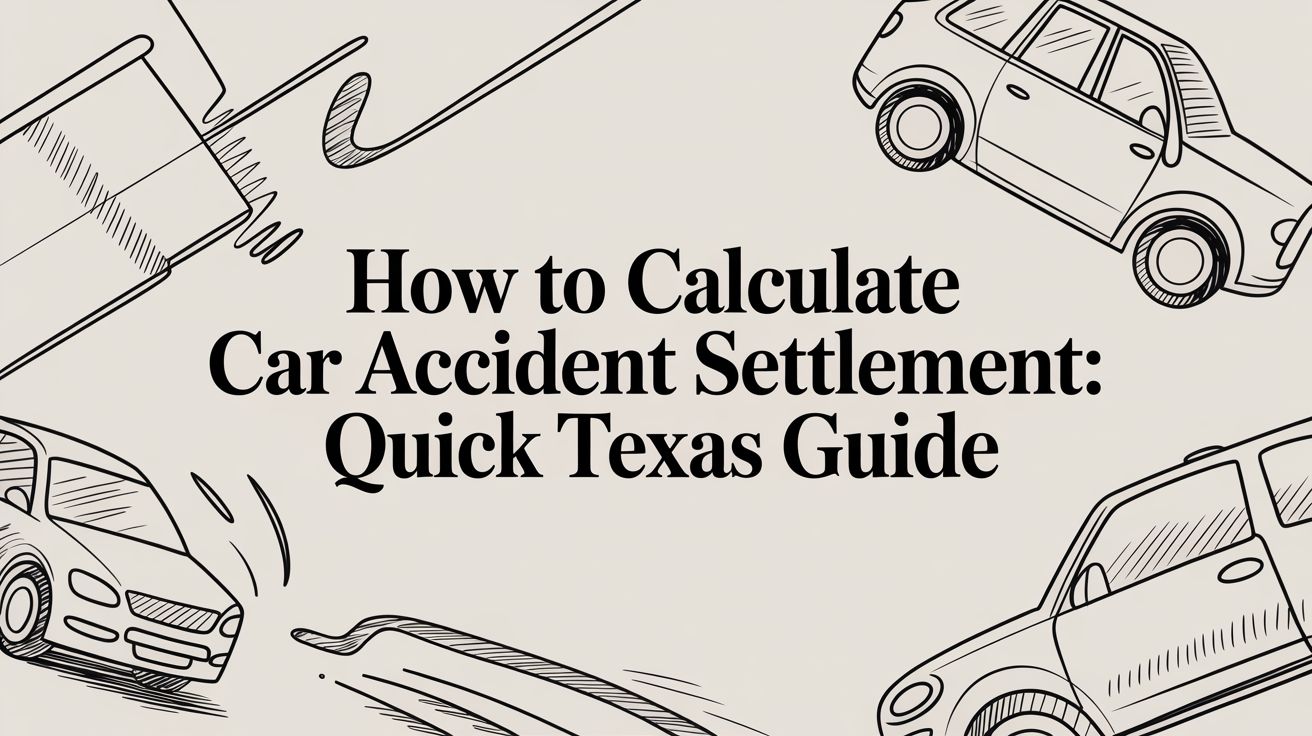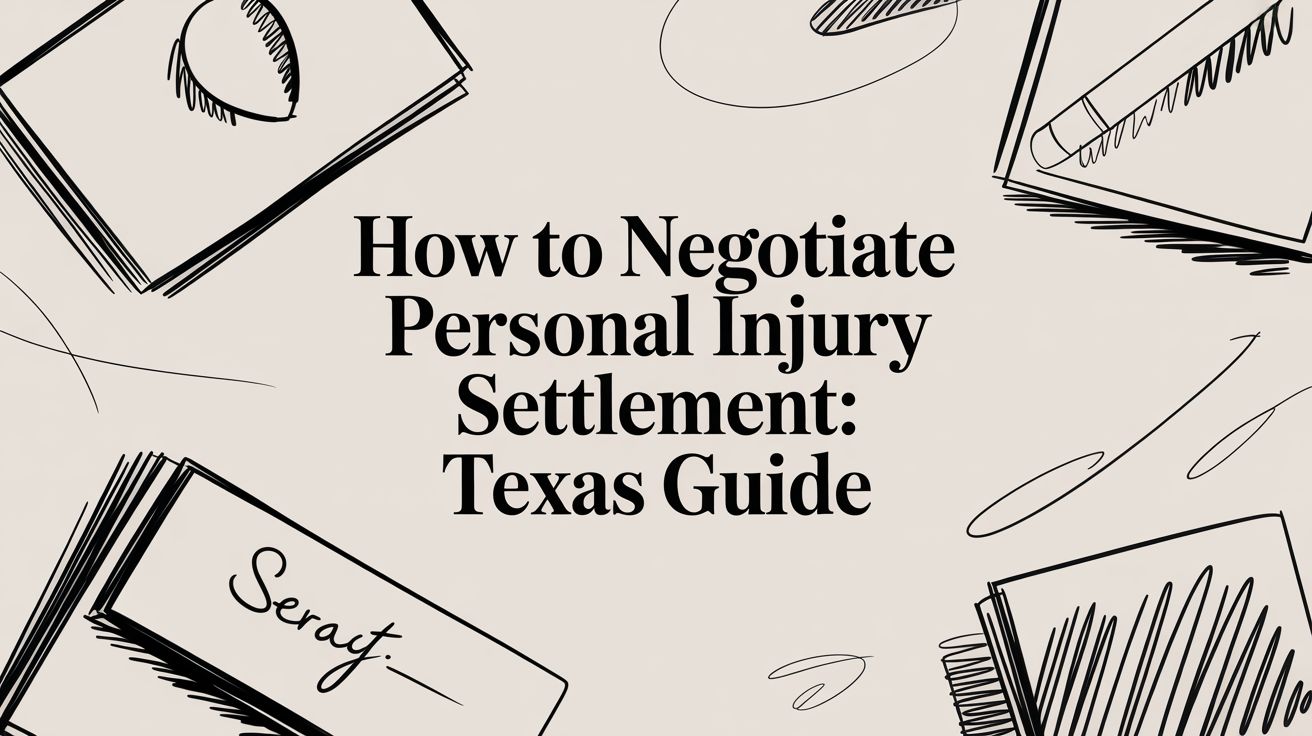A serious accident can change your life in seconds — but you don’t have to face it alone. After you’ve been in a serious car wreck, one of the first questions that comes to mind is, "How long is this going to take?" While a simple fender-bender might wrap up in a few months, a complex case with severe injuries can easily stretch out for a year or even longer. The honest answer is, there's no magic number because every single crash is different.
Understanding the Car Accident Settlement Timeline
Getting the compensation you deserve is a process with several distinct stages. Knowing what's coming can give you a sense of control during a really uncertain time. For a bird's-eye view of the entire process, check out a comprehensive guide to car accident settlements.
The timeline often feels like it's crawling at a snail's pace. That’s because each step has to be handled meticulously to protect your rights and make sure you get a fair deal for your medical bills, lost paychecks, and suffering.
The Core Stages of a Claim
Even though the timelines can vary wildly, most claims follow a similar path. The infographic below gives you a good visual of how things typically flow, from the moment of the crash all the way to the final check.
This journey is about more than just one phone call with an adjuster. It’s a process that unfolds alongside your physical recovery, a detailed investigation, and the legal back-and-forth.
For many people, just getting started with the paperwork can feel overwhelming. We've put together a step-by-step guide to help you through it; you can learn more about how to file a car accident claim right here.
Typical Stages of a Car Accident Claim and Their Timelines
To give you a clearer picture, let's break down the journey into its key phases. The table below outlines what happens at each stage and offers a rough estimate of how long you can expect each one to take.
| Stage of Claim | Typical Duration | What Happens During This Stage |
|---|---|---|
| Initial Medical Treatment & Reporting | 1-2 Weeks | You seek immediate medical care for your injuries and report the accident to your insurance company. |
| Investigation and Evidence Gathering | 4-8 Weeks | Your attorney collects police reports, witness statements, medical records, and photos of the scene and vehicles. |
| Maximum Medical Improvement (MMI) | Varies (Months to 1+ Year) | This is the point where your doctor says your condition has stabilized. We can't know the full value of your claim until this happens. |
| Demand Letter and Negotiation | 1-3 Months | We send a formal demand package to the insurance company, which starts the negotiation process. |
| Settlement or Filing a Lawsuit | Varies | If a fair settlement is reached, the case ends. If not, a lawsuit is filed, moving the case into litigation. |
| Receiving Your Settlement Check | 2-6 Weeks | After a settlement agreement is signed, it takes time to process the payment, pay liens, and issue your final check. |
Keep in mind, these are just averages. A straightforward case might move quickly, while a complex one involving disputes over fault or severe injuries will naturally take more time to resolve correctly.
A lot of people think a fast settlement is a good settlement. The truth is, rushing things often means taking a lowball offer that won't cover your future medical bills or long-term lost income. Patience, with an experienced lawyer guiding you, is what gets you the full compensation you actually deserve.
Whether it was a minor collision on a quiet street in The Woodlands or a multi-car pileup on a Houston freeway, the complexity of the wreck will always drive the timeline. The real goal isn't just to close your case fast—it's to close it right, making sure your financial future is secure.
Key Factors That Influence Your Settlement Timeline
While every car accident claim generally follows the same steps, no two cases are on the exact same clock. Several key factors can stretch a settlement timeline from weeks into months, or even years. Understanding these variables is the first step to setting realistic expectations and realizing why patience is often your most powerful tool.
The single biggest factor dictating the timeline is the severity of your injuries. Think about it: you can't know the true cost of a crash overnight. Before any lawyer worth their salt will even consider settling, you have to reach what’s called Maximum Medical Improvement (MMI).
MMI is the point where your doctor says your condition is as good as it's going to get. They have a clear picture of your long-term prognosis. Settling before you hit MMI is a massive gamble. You might not know if you'll need another surgery down the road, years of physical therapy, or lifelong medication. A quick settlement could mean paying for all of that out of your own pocket.
Disputes Over Who Was at Fault
Another huge roadblock is any disagreement over who caused the wreck. If the other driver denies they were responsible or, even worse, points the finger at you, the brakes get slammed on the whole process.
Texas operates under a legal principle called modified comparative responsibility. In simple terms, this means you can still get compensation as long as you weren't 51% or more to blame for the accident. But here's the catch: your final settlement gets reduced by whatever percentage of fault is assigned to you. For example, after a Houston freeway crash, if you're found 20% at fault, your total award is cut by 20%. Insurance companies love to use this rule to drag things out and chip away at what they owe you.
An insurance adjuster’s job isn't to be fair; it's to protect their company's profits. They will intentionally delay, ask for mountains of paperwork, and hope you get so frustrated that you accept a lowball offer just to make it all stop.
Other Common Causes for Delay
Beyond injuries and fault, a few other things can really slow down your claim:
- Strength of Your Evidence: A case with a clear police report, credible witness statements, and solid medical records will always move faster than one built on shaky ground.
- Multiple Parties Involved: Crashes with more than two vehicles, like a multi-car pileup on I-35 or a wreck with a commercial truck, are instantly more complicated. Every driver and their insurance company has a different story, which means a much deeper investigation is needed.
- Insurance Company Tactics: Let's be blunt: some insurance carriers are notorious for their delay tactics. They might make endless requests for documents or go silent for weeks, all in an effort to wear you down.
An experienced Texas personal injury lawyer knows how to manage these factors, push back against the insurer's games, and build a case that shows them you're serious. This is crucial when it comes time to figure out how to calculate the full value of your car accident settlement. And while the legal battle is important, don't forget the personal one. We always encourage clients to focus on their well-being by addressing the emotional toll of a car accident as part of their recovery.
How Long Do You Have to File a Claim in Texas?
While you're trying to heal from your injuries and deal with the stress of a car wreck, the last thing on your mind is some legal countdown. But in Texas, an invisible clock starts ticking the moment your accident happens. Missing these deadlines isn’t a minor hiccup; it means losing your right to seek compensation forever.
Getting a handle on these time limits is one of the most important things you can do to protect yourself and your family. The most critical deadline of all is the statute of limitations. This is a law that puts a hard stop on how long you have to file a lawsuit after being hurt.
The Two-Year Statute of Limitations in Texas
For most personal injury claims in Texas, including those from car accidents, you have two years from the date of the crash to file a lawsuit.
Think of the statute of limitations as a two-year window of opportunity. If you don't file a lawsuit within that timeframe, the court will almost certainly throw your case out—it doesn't matter how strong your evidence is or how severe your injuries are. Insurance companies know this rule inside and out and will absolutely use it against you.
Let's say you were in a multi-car pileup on a Houston freeway, and your injuries required months of physical therapy. If you wait two years and one day to file a lawsuit, the at-fault driver's insurance company has no legal reason to pay you a dime. The door to justice slams shut for good.
The two-year deadline isn't just a suggestion—it's a hard stop. Waiting too long is one of the costliest mistakes an accident victim can make, and it’s completely avoidable with prompt action.
Other Critical Deadlines to Watch
While the two-year rule is the big one, other deadlines can be even shorter and just as devastating if you miss them. These often pop up in specific situations that can easily catch you off guard if you're not careful.
It's vital to know about these other time-sensitive requirements:
- Claims Against Government Entities: Were you hit by a city bus, a county vehicle, or another government-owned car? If so, you’re on a much tighter schedule. In many Texas cities and counties, you must provide a formal "notice of claim" in as little as 45 to 90 days. Missing this initial notice period can kill your claim before it even starts.
- Uninsured/Underinsured Motorist (UM/UIM) Claims: If the driver who hit you was uninsured or didn't have enough coverage, you’ll likely need to file a claim with your own insurance company. Your policy will have its own deadlines for reporting the crash and making a claim, so you need to review it right away.
- Wrongful Death Claims: If you tragically lost a loved one in a fatal crash, the two-year statute of limitations still applies. For families grieving an unimaginable loss, this deadline can arrive with shocking speed. A compassionate wrongful death lawyer in Texas can manage these legal requirements so your family can focus on healing.
These deadlines are complex and unforgiving. The surest way to guarantee you don't miss a critical date is to talk with a Texas personal injury lawyer as soon as possible after your accident. We can immediately pinpoint all the deadlines that apply to your case, handle the paperwork, and protect your legal rights while you focus on getting better. Your story deserves to be heard, and acting quickly ensures it will be.
What Happens When Your Case Goes to Court
While the overwhelming majority of car accident claims get resolved without ever seeing the inside of a courtroom, sometimes the insurance company just won't play fair. When talks break down and the adjuster digs in their heels with a lowball offer, filing a lawsuit becomes the only way to demand the justice you deserve.
The idea of "going to court" can sound scary, but it's important to know that filing a lawsuit doesn't mean you're headed for a dramatic courtroom trial tomorrow. It's really just a structured legal process that levels the playing field and forces the other side to finally take your claim seriously. In fact, many cases that enter this phase still settle long before a trial ever begins.
The Litigation Process Unpacked
Once your attorney files a lawsuit, your case officially enters a formal stage called litigation. This isn't a single event but a series of steps designed to get the case ready for a potential trial. It definitely adds time to the settlement timeline, but for complex or high-value claims, it's an absolutely essential step.
For example, after a catastrophic truck crash in Houston, litigation is almost always a given. It's the only way to compel the trucking company to hand over critical evidence like driver logs, maintenance records, and internal safety memos that can expose their negligence.
When litigation is needed because of a dispute over fault or because of severe injuries, your claim's timeline can stretch out quite a bit. The discovery, mediation, and trial prep stages alone can easily add six to twelve months, and sometimes even longer. You can discover more insights about legal procedures on callkellycall4.com to get a better sense of these timelines.
Key Phases of a Lawsuit
The litigation process follows a pretty clear roadmap. Getting familiar with these stages can take a lot of the mystery—and anxiety—out of the whole thing.
Here are the main phases you'll go through:
-
Filing the Petition: Your lawyer kicks things off by filing a formal complaint (called a "petition" in Texas) with the court. This document officially starts the lawsuit and lays out exactly what you're alleging against the at-fault driver.
-
The Discovery Phase: This is the longest and most work-intensive part of the entire lawsuit. It's the formal evidence-gathering process where both sides have to exchange information. This is where the truth really comes out. Discovery involves a few key activities:
- Interrogatories: These are written questions sent to the other side, which they are required to answer under oath.
- Requests for Production: Think of this as a formal demand for documents. It could be a request for the truck's maintenance records in a commercial vehicle case or the other driver's cell phone records to prove distracted driving.
- Depositions: This is a formal Q&A session where your attorney questions the other driver, key witnesses, or expert witnesses under oath. Everything is recorded word-for-word by a court reporter.
-
Mediation: In Texas, before a case can go to trial, the parties are almost always ordered to attend mediation. This is a formal settlement meeting guided by a neutral third-party mediator. The mediator’s job isn’t to pick a side but to help both parties find a middle ground and hash out a resolution. A huge percentage of cases settle right here.
-
Trial: If mediation doesn't lead to a settlement, the final step is taking your case to a judge and jury. Both sides will present their evidence, call witnesses to testify, and make their closing arguments. The jury then decides who was at fault and what amount of compensation you should receive.
Filing a lawsuit is a powerful move. It sends a clear signal to the insurance company that you won't be pushed around or forced to accept a penny less than your case is worth. It makes them assign real resources to your claim and often brings them to the table ready to negotiate in good faith.
Facing the possibility of court can feel like a lot to handle, but you don't have to face it by yourself. An experienced Houston car accident attorney manages this entire process for you—handling every deadline, every document, and every deposition. We are here to guide you with strength and compassion, making sure your rights are protected every step of the way.
How an Experienced Texas Personal Injury Lawyer Can Help
Trying to navigate a car accident claim on your own can feel impossible. You're juggling doctor's appointments, living with pain, and watching medical bills pile up. The last thing you need is the added stress of fighting an insurance adjuster whose only job is to pay you as little as they can get away with.
This is where an experienced Texas personal injury lawyer steps in. Hiring an attorney isn't just about paperwork; it's about leveling the playing field. Insurance companies have teams of professionals dedicated to protecting their profits. A lawyer becomes your advocate, investigator, and negotiator, making sure your rights are protected.
Taking Control of the Process
From the moment you hire our firm, we take over every part of your claim so you can focus on what matters most—getting better. We handle all communication with the insurance companies, putting a stop to the endless phone calls and requests designed to wear you down.
This immediate action sends a clear signal: you won't be bullied into accepting a lowball offer. Having a lawyer on your side forces the insurer to act in good faith and often speeds up the timeline by ensuring all evidence and deadlines are handled professionally.
An experienced lawyer will immediately launch a thorough investigation, which often includes:
- Gathering Critical Evidence: We'll track down police reports, find and interview witnesses, and secure any photos or video footage from the scene.
- Consulting with Experts: For complex cases, like those involving a catastrophic injury or a commercial truck, we may bring in accident reconstructionists to prove exactly how the crash happened.
- Documenting Your Damages: We meticulously collect every medical record, bill, and proof of lost income to build an undeniable case for your compensation.
Maximizing Your Compensation
Perhaps the most important role an attorney plays is calculating the full and fair value of your claim. An insurance adjuster will never tell you what your case is truly worth. They’ll make an offer that covers the bare minimum, often ignoring the long-term impact of your injuries.
An attorney looks at the complete picture of your life after the accident. We calculate not just your current medical bills but also the cost of any future surgeries, physical therapy, or long-term care you might need. We also fight for compensation for your pain and suffering, which is often the largest component of a settlement.
This comprehensive approach is especially vital in the most tragic cases. For families grieving the loss of a loved one, a compassionate wrongful death lawyer in Texas is essential to securing financial stability for the future. You might be wondering about the right time to get legal help, so we've put together a guide explaining when to hire a personal injury lawyer to give you more clarity.
The table below breaks down some of the key differences between managing a claim yourself and having a professional by your side.
Handling a Claim With vs. Without an Attorney
| Task | Handling It Yourself | With an Experienced Attorney |
|---|---|---|
| Communicating with Insurers | You field constant calls and requests from adjusters trying to get a statement. | All communication goes through your lawyer, protecting you from pressure tactics. |
| Gathering Evidence | You're responsible for tracking down police reports, photos, and witness info. | Your legal team conducts a professional investigation to build a strong case. |
| Calculating Damages | You might only consider current bills, missing the full value of your claim. | Your attorney calculates all current and future costs, including pain and suffering. |
| Negotiating a Settlement | You face experienced negotiators alone, often receiving lowball offers. | A skilled negotiator fights for the maximum compensation you deserve. |
| Meeting Deadlines | You risk missing critical legal deadlines, which could end your case. | Your lawyer manages all deadlines, including the statute of limitations. |
| Going to Court | If negotiations fail, you would have to represent yourself in a lawsuit. | You have a proven trial lawyer ready to take your case to court if necessary. |
Ultimately, having a skilled Houston car accident attorney in your corner means you have a dedicated professional fighting to ensure you get a settlement that truly covers your losses. You don't have to face this journey alone. We're here to provide the strength and experience you need to move forward with confidence.
Common Questions About Texas Settlement Timelines
When you're trying to heal after a serious crash, the last thing you need is more uncertainty. We've found that getting straightforward answers can bring a lot of peace of mind, so we've put together some of the most common questions we hear from our clients about the settlement process.
What Should I Say to the Insurance Adjuster?
You can bet the at-fault driver's insurance adjuster will call you, and it will probably be very soon after the accident. It's critical to remember who they work for. Their job isn't to help you; it's to protect their company's bottom line by paying out as little as possible.
Stick to the absolute basics: your name, the date of the wreck, and that's it. Never agree to give a recorded statement, don't guess about how you're feeling, and never admit any fault. The best move you can make is to politely tell the adjuster that your attorney will be in contact, and then hang up the phone.
What If My Injuries Get Worse After I Settle?
This is a huge risk and exactly why we tell clients never to settle a claim until they've reached what's called Maximum Medical Improvement (MMI). Once you sign that settlement agreement and cash the check, the case is closed for good. You give up all rights to seek more money for that accident, no matter what happens.
If you find out a few months later that you need another surgery or will require physical therapy for years to come, you can't go back and ask for more. This is a financially devastating mistake that forces you to pay for ongoing medical care out of your own pocket. A good lawyer makes absolutely sure your settlement accounts for all known and potential future medical needs.
A deep dive into over 4,600 auto accident cases found something telling: claims with clear fault and moderate injuries tend to settle within 6 to 9 months after medical treatment ends. This really drives home the importance of finishing your recovery before you even think about signing a settlement. You can read the full research about these settlement timelines for a closer look.
How Does the Settlement Check Get Distributed?
Once everyone agrees on a number, the insurance company doesn't send the check directly to you. Instead, it goes to your attorney’s office, where the funds are placed into a secure trust account.
From that account, your lawyer handles all the final housekeeping. This means paying off any outstanding liens against your settlement, which typically includes:
- Unpaid bills from hospitals, doctors, or specialists.
- Reimbursing your health insurance company for what they covered.
- Covering your attorney's fees and the case expenses.
After every single one of those obligations is paid, the rest of the money is yours. Your attorney will provide you with a detailed breakdown showing exactly where every penny went for complete transparency. This process ensures all your accident-related debts are wiped clean, letting you move forward without that financial weight on your shoulders.
At The Law Office of Bryan Fagan, PLLC, we know that a serious accident can be overwhelming, but we want you to know that recovery is possible and legal help is available. We're here to provide you with the clear, straightforward answers you deserve. Schedule a free, no-obligation consultation with our compassionate personal injury team today to discuss your case and find out how we can help you get back on your feet. Visit us at https://texaspersonalinjury.net to get started.


